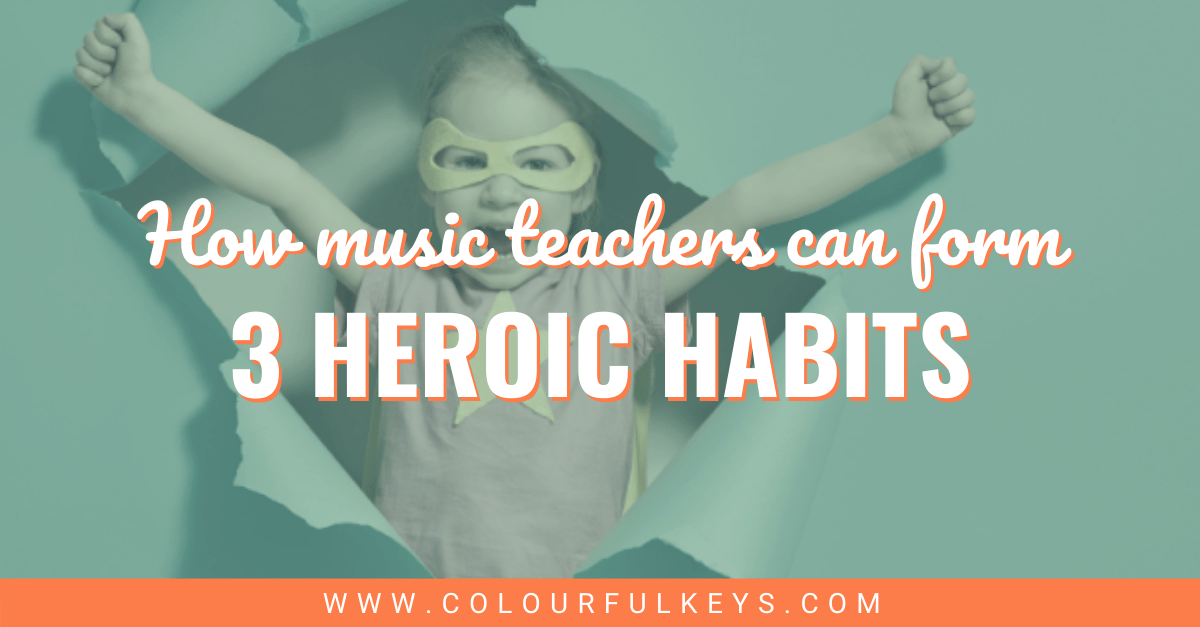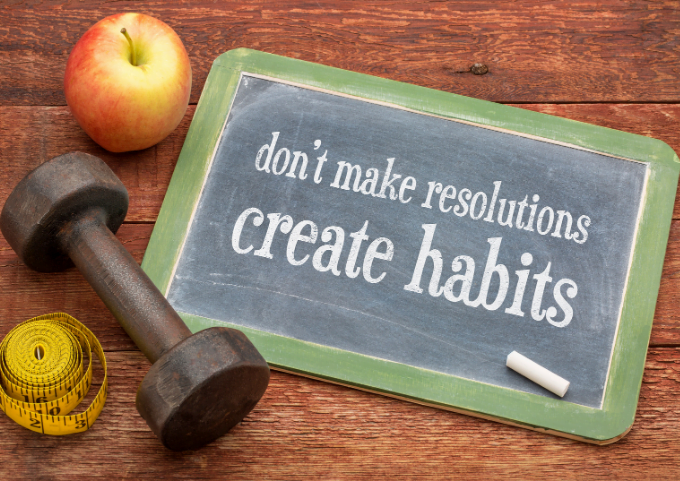The best habits for music teachers are the ones which can bring balance into their teaching and life.
Small changes matter. These tiny habits can make a big difference precisely because they are so small.

⬆️ Listen to the podcast above or keep on reading, whichever fits your style. ↙️
I call these ideas “heroic” because they are easy alterations which could literally change your life.
The idea for these kinds of small changes which lead to bigger ones comes from the book Atomic Habits by James Clear. (Isn’t it just too perfect that his name is “Clear”?!)
When I started thinking about applying his ideas to music teachers specifically, I was thinking back on what I’ve seen make the biggest impact for teachers in our membership community.
These 3 habits for music teachers are the ones I think can make the biggest difference with the smallest effort. Let’s dive in.
Heroic Habit 1: Improv Intro
One of the things teachers struggle to fit into their lessons is improvisation.
Some teachers are apprehensive about or don’t see the relevance of improvisation. But I’ve discovered that many more actually want to include creative activities in lessons but they just never seem to find the time.
We’re all tight on time in our music lessons, sure. However, at the end of the day, it all really comes back to priorities and habits.
If you find time to work on reading and technique but not improvisation – you probably just don’t have a habit of improvising in lessons yet.
The simplest way to cultivate that habit is to do it first.

Just improvise with your student for the first 2 minutes of every single lesson. Try it for a whole month and see how you feel.
This heroic habit can really start to pull its weight quickly. Before long you might just find improvisation and creative pursuits creeping their way into the rest of your lesson time, too, and becoming an integrated part of how you teach.
Heroic Habit 2: System Shut-Down
If you’re one of those teachers who is kept up at night wondering about how to solve a student’s collapsing fingertip joints or worrying about a parent’s finances, this is the heroic habit for you.
The system shut-down provides a clear end-point for your day so that you can transition to non-work time even if you’re in the same space.
- Choose a trigger for your system shut-down such as closing your studio door, putting away your notebook or turning off your computer. Make sure you choose something you can do last every time.
- Choose a phrase to say aloud after you have completed this trigger such as “shut-down complete” or singing a perfect cadence.
Do not break your rules. After the system is shut down each day, you may not do any work.
You can’t stop yourself thinking about work. The reason this habit for music teachers works, though, is because it creates a ritual to separate work and regular life.
Eventually, your brain will learn – no matter how much it shouts at you from system shut-down to the start of work the next day – it will not get results. And, over time, that voice might learn to perform a beautiful perdendosi at the end of each day.
Heroic Habit 3: Success Story Saturday
This is something we do every week inside the Vibrant Music Studio Teachers group on Facebook.

Writing down success stories isn’t about bragging. It isn’t even about success, really. It’s about turning your focus towards the good things.
We all have challenging weeks, months or years in our teaching life. The purpose of success story habit isn’t to deny those difficulties or brush them under the rug.
But something is always going right.
And by focussing on the good, we might be able to shine a little more sunshine into the tricky parts of our work.
What’s your heroic habit?
What’s one thing you do which makes a big difference in your life or paves the way for other good habits for piano teachers? We’d love to hear about your experiences in the comments. 🙂
If you need more help organising your studio and life, visit my Studio Business page and scroll down to the Organisation section.

I plan lessons right after teaching them, either after a lesson, or group of lessons (in the case of back-to-back lessons). By doing it right away, I found that all the information is fresh in my mind and so I am now averaging about 5-8 minutes less time spent per student rather than when I would not plan right after teaching!
I do that too! Works perfectly.